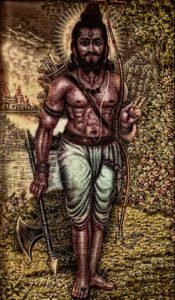
Let us remember how Kunti, before her marriage to Pandu, had a son with Vivasvan, the Deva of the sun. Karna is one of the main characters of Maha-bharata, therefore we must go back in time to scroll through the pages of the history of this particular figure until the present moment.
Abandoned to the Ganges current and followed by a girl who watched over it from the shore, the basket with the baby had been collected by Atiratha and his wife Radha. Not knowing who the parents who had abandoned him were, the two, who were childless, decided to adopt the child.
The years had passed, and Karna had grown up.
Atiratha belonged to the Suta caste, who were in charge of driving the war chariots of the Kshatriyas. Being that his natural activity, he had tried to teach it to his son, introducing him to the secrets of the trade, but since childhood Karna had always refused to follow his father. He did not like driving chariots or receiving orders from the warriors. On the contrary, he was enchanted as soon as he saw a bow, a sword, or a famous warrior riding his horse. He wanted to become a Kshatriya, not a Suta.
When he talked to his father about it, he had remained somewhat dubious, aware of how complicated it was in those days to change the occupational duties pertaining to the caste of birth. For years, he had tried to change his mind, but to no avail; Karna wanted to become a soldier at all costs.
So one day his father told him:
“I can’t teach you how to fight, but if you really want to learn you have to find a teacher to teach you; you can’t do it alone.”
Karna, driven by the strong warrior nature that he always felt within himself, upon reaching the right age, left the house and set out in search of a worthy master to initiate him into the noble martial arts. But that, unfortunately, was not the only worry that troubled the life of the unfortunate man. Another problem anguished him enormously. His father had told him, in fact, how he had picked him up from the waters of the Ganges and the mystery that hovered around his birth. The desire to discover his true origins had always weighed heavily on his heart.
In his travels in search of a guru, we also found him in Hastinapura, where he was partially rejected by Drona for the same reason that Ekalavya had been rejected. But Karna had not sworn eternal dedication to that particular master; his strongest desire was to become a Kshatriya, so any master, as long as he was qualified, would be fine. However, no one was able to accept him as a disciple because of the humility of his origins.
From whomever he went, the answer he received was the same: “You are the son of a Suta, I cannot accept you as a disciple.”
And so Karna had continued to wander, feeling more and more frustrated and humiliated with each refusal: no one wanted to teach him the art of fighting. More than once he had felt discouraged, but at the thought that in all probability he could never do anything other than the Suta, he had finally preferred to take a big risk: to go to Parasurama and when he would ask him about his family he would lie.
“If I tell him that I am a Suta, he will reject me for the same reason that others have rejected me; if instead I claim to be a Kshatriya he will reject me as he hates Kshatriyas. So I will have to tell him that I am a Brahmana.”
Karna’s considerations were correct; in fact, those who know the story of Parasurama know that he was a divine avatar who came down to earth to annihilate the entire warrior race, which he had done twenty-one times. In his very nature there was therefore a strong resentment towards the whole class that had fought so bitterly. To present oneself as such would have been even less advisable than to present oneself as a Suta.
He had traveled for days, until he reached the sage’s place of retreat in the Himalayas. Seeing him, for a moment he hesitated. Parasurama’s appearance was truly terrible: he was tall and imposing with a strong and powerful figure. He was dressed in simple ascetic garments and wore his hair gathered in a single point above his head. But what had struck him in a particular way were his eyes, which shone like hot coals and a strong mystical energy that emanated from his whole being. After offering him respectful obeisances, Karna spoke to him.
“Respectable Rishi, I am the son of a Brahmana, and I have come to you to learn the art of using weapons. Accept me as a disciple, and I will serve you with all my being.”
This is a section of the book “Maha-bharata, Vol. 1”.
To buy the complete book, click above
Post view 272 times


